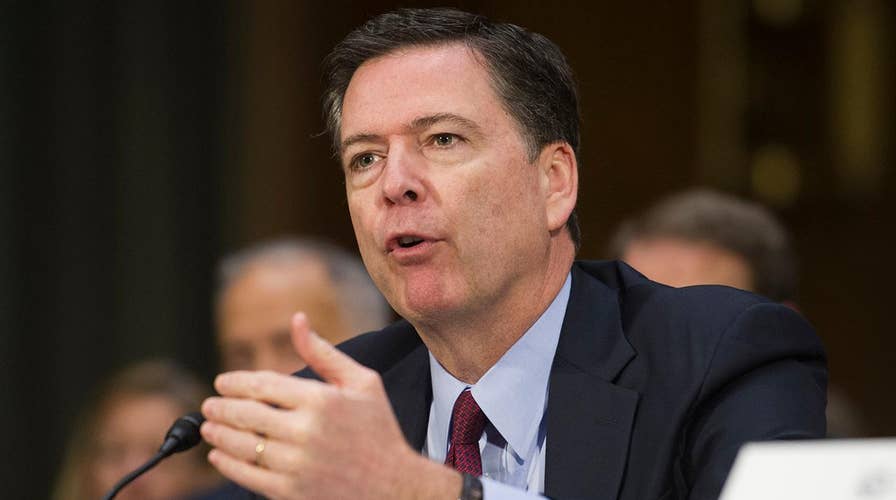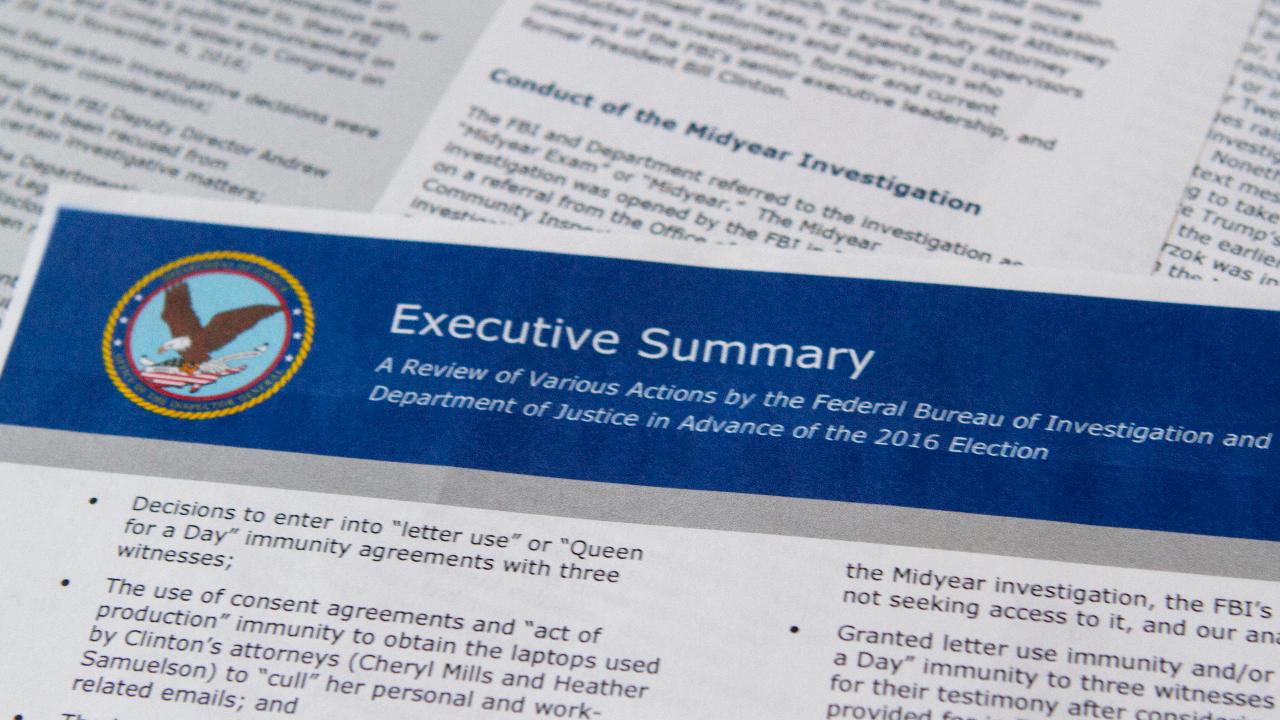IG Report: Comey broke protocol
Comey's decisions had a fateful impact on the 2016 campaign; Catherine Herridge reports from the Justice Department.
The report issued Thursday by highly respected Justice Department Inspector General Michael Horowitz on the FBI’s handling of the Hillary Clinton email investigation shows that FBI Director James Comey deserved to be fired for his actions. But an important question is unanswered: How has the report been changed from Horowitz’s findings as he originally presented them?
The report made public is apparently a revised version of an earlier draft written by Horowitz. It is imperative that Congress and the public get to see the first draft as well as the final product, in order to determine whether there have been significant changes – and if so, whether they were motivated by political considerations or basic fairness.
The rules of the Justice Department provide that anyone criticized in an IG report has the right to suggest factual corrections. That seems fair, and if that is all that was done, there should be no complaints. But if the published draft improperly whitewashed any individuals or scrubbed any valid criticisms, we have a right to know.
In an age of growing distrust by the American public of the Justice Department, the FBI, and Special Counsel Robert Mueller and his probe of Russian interference in the 2016 election, it is imperative that Inspector General Horowitz maintain his credibility as a guardian of truth, objectivity and political neutrality within the department.
As expected, the report was critical of Comey for “deviating” from the policies and traditions of the FBI when he made public announcements during the windup of Clinton’s presidential campaign and gave his opinion regarding her conduct in dealing with emails during the period she served as secretary of state in the Obama administration.
The report characterized Comey as “insubordinate,” but concluded that he was not motivated by any partisan political bias.
I agree with the report that Comey’s actions were not motivated by partisan considerations. He really didn’t care who won the election. He certainly didn’t want Donald Trump to defeat Hillary Clinton, even though his actions as FBI director may have contributed to that result.
Comey’s motivations were worse than partisan. They were personal. He placed his own personal reputation above that of the department and above partisan considerations. He believed that Clinton was going to win the election, and he was worried that if he didn’t disclose matters pertaining to the investigation of her that he personally would be criticized by the Trump people when they lost the election.
So Comey figured that by providing information that hurt the winning candidate, he would protect himself from such criticism. By placing concern for his own reputation over the rules and standards of the Justice Department, he more than deviated – he abused his trust for personal gain.
The condemnation of Comey in Inspector General Horowitz’s report should have been much harsher.
Had Clinton been elected, she certainly would have been justified in firing Comey for his handling of the email investigation. That is the justification provided by Deputy Attorney General Rod Rosenstein in his letter calling for Comey’s firing. The fact that Comey deserved to be fired for this reason is supported by the IG report.
But it is alleged that the real reason why President Trump fired Comey was because the FBI director was investigating the Russia matter.
What’s the truth?
The key witness to President Trump’s motive in firing Comey will, of course, be Rosenstein. That is why Rosenstein should have recused himself from Day One from any investigation of President Trump that might involve the firing of Comey.
On a more fundamental level, President Trump was empowered to fire Comey for any reason, no reason or even a bad reason. Our Constitution precludes inquiring into the motives of the president (as distinguished from questioning the motives of the former director of the FBI) who has taken actions authorized by Article II.
So perhaps, the reason why Rosenstein has remained on the case is because he knows that the firing of Comey can never be the basis for a criminal or impeachment charge.
The IG report is 568 pages long. I have perused it and carefully read the conclusions and recommendations. Neither side will be happy, because the report itself seems cautious and balanced. Its recommendations are indisputable.
Partisan Republicans will not be satisfied with the report’s conclusion regarding Clinton: that the decision not to prosecute her was reached properly, by the book.
Partisan Democrats will not be satisfied with the report’s unwillingness to conclude that Comey’s comments swung the election to Trump.
For me, the major takeaway from this report by Michael Horowitz is that it conclusively demonstrates why we do not need a special counsel to conduct the Russia probe now underway, and why the appointment of Robert Mueller in this case was ill-advised.
The report demonstrates that there are institutions within the Justice Department capable of rendering fair and impartial justice. There is no need – except in the most extraordinary cases – to go outside the Justice Department and spend millions of dollars of taxpayers’ money and to place targets on the backs of particular individuals.
Career Justice Department officials – non-political civil servants who serve under presidents of both parties – were entirely capable of investigating the Russia matter and other matters being looked into by Mueller.
Moreover, Mueller’s extremely close personal and professional association with tainted former FBI Director Comey raise serious questions about whether Mueller was the right person for the job. I do not think he was.
There is every reason to wonder whether Mueller will lean over backwards to protect Comey. If the Justice Department felt the need to pick an outside lawyer to conduct the investigation – and I do not think the need was justified – it should have gone to someone who has no connection with any of the people involved in the earlier investigation.
Mueller is himself a former FBI director, so has clear connections to individuals serving in the bureau, including Comey.
All in all, the IG report will help to restore the trust of the public in our nation’s Justice Department. If the recommendations in the report are followed, the future will be brighter than the past when it comes to the politicization of law enforcement. We still have a long way to go to restore trust, but this report is a good beginning.


